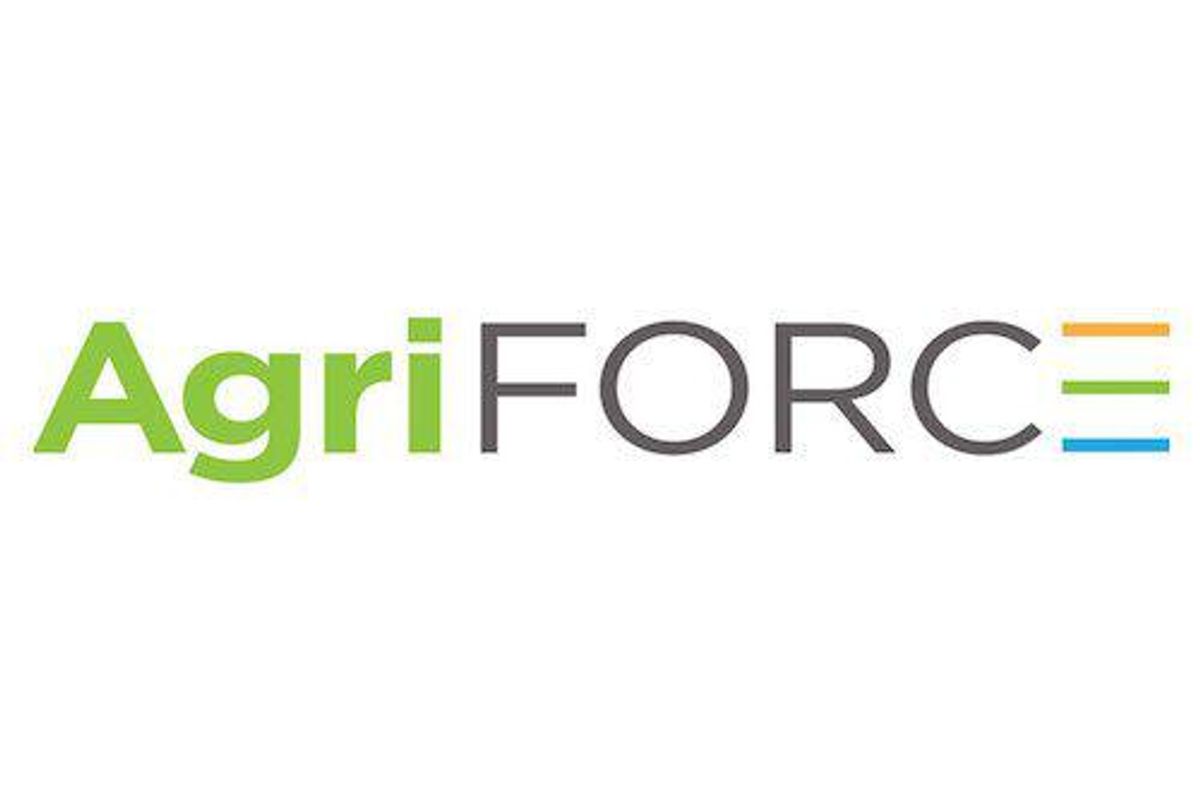AGRIFORCE Growing Systems Ltd. ("the Company") (NASDAQ: AGRI; AGRIW) an IP-focused AgTech company dedicated to advancing sustainable cultivation and crop processing across multiple platforms, has entered into a binding letter of intent to acquire a leading AgTech European consultancy focused on driving AGRIcultural optimization, innovation, solutions and operational expertise in the AGRIculture and horticulture and Controlled Environment AGRIculture (CEA) sectors.
With global operations and over 200 employees, this AgTech consultancy achieved 2020 annual consulting audited revenues of over US$26 million and EBITDA of US$3 million (IFRS based), and it expects to end the year 2021 with revenues of US$28 million (as estimated by the target's management and subject to due diligence) (1).
The binding LOI is subject to completion of standard due diligence and entry into a definitive purchase agreement within 45 days, which shall include commercially standard terms and conditions, including, but not limited to, representations and warranties, covenants, events of default and conditions to closing.
The purchase price by AgriFORCE is estimated to be in the range of US$29 million (1) with a mix of cash and stock, with all stock issued in private placement transactions exempt from registration under Section 4(a)(2) of the Securities Act of 1933.
(1) Based on FX Rate Euro to US$ 2020 1.141357 and 2021 Euro to US$ 1.192735
Transaction Highlights
The AgriFORCE acquisition of this leading European AgTech consultancy is expected to provide the following strategic benefits:
- AgriFORCE plans to leverage the consultancy's decades of experience, established customer base and deep industry relationships to accelerate deployment of its proprietary AgriFORCE Grow House and related IP, including facility and lighting design, automation and artificial intelligence, fertigation and nutrients, as well as micropropagation and genetics.
- The consultancy has generated strong historical financial performance and consistent growth across Europe and internationally. AgriFORCE plans to build on this growth through expansion of these consulting operations and the establishment of a research and development center in North America, higher penetration of its Asian markets, as well as expanding AgriFORCE's operations in Europe,
- This acquisition is intended to place the combined operations at the forefront of knowledge and IP development and research, which AgriFORCE plans to augment with increased revenue from technical solution platforms in the key CEA verticals.
Ingo Mueller, CEO of AgriFORCE Growing Systems, commented: "This acquisition is an alliance of our complementary expertise and shared values. Both AgriFORCE and this leading European AgTech consultancy are dedicated to making positive change in the lives of farmers and consumers. This is an unprecedented opportunity for exceptional innovation and through our synergies, expanded growth in both North America and Europe for both organizations." He added: "We look forward to a robust collaboration around IP development and implementation that will support farmers all around the world in improving all aspects of agriculture – from seed to table."
Troy McClellan, President of AgriFORCE Solutions, added: "This is a key step for AgriFORCE to drive a strategic integration approach of crops, operations, facilities, systems and environment in the development of IP that improves controlled-environment agriculture (CEA), and field agriculture, including plant yields, nutrition, taste and pureness of quality. Our goal is to address some of the biggest challenges and legacy issues in these key critical sectors and in the continual pursuit of clean, green, better crops and plant-based products and ingredients."
About AgriFORCE
Dedicated to providing more sustainable and better quality food, plant-based products and ingredients, pharmaceuticals and nutraceuticals, AgriFORCE Growing Systems Ltd. (NASDAQ: AGRI; AGRIW) is an AgTech company focused on developing and acquiring innovative AGRIculture IP that changes the way cultivation and crop processing are done. The Company's vision is to be a leader in delivering plant-based foods and products through advanced and sustainable AgTech solution platforms that make positive change in the world – from seed to table. The AGRIFORCE foundational IP – called the AGRIFORCE Grow House – includes a proprietary facility design and automated growing system for high-value crops focused on improving the way that controlled-environment AGRIculture (CEA) is done. The AGRIFORCE Grow House was designed to produce in virtually any environmental condition and to optimize crop yields to as near their full genetic potential possible, while using substantially fewer natural resources and eliminating the need for the use of pesticides and/or irradiation. The AGRIFORCE goal: Clean. Green. Better. Additional information about AGRIFORCE is available at: www.agriforcegs.com .
This press release contains forward-looking statements within the meaning of the "safe harbor" provisions of the Private Securities Litigation Reform Act of 1995. Statements other than statements of historical facts included in this press release may constitute forward-looking statements and are not guarantees of future performance, condition or results and involve a number of risks and uncertainties. Actual results may differ materially from those in the forward-looking statements as a result of a number of factors, including those described from time to time in our filings with the Securities and Exchange Commission and elsewhere. The Company undertakes no duty to update any forward-looking statement made herein. All forward-looking statements speak only as of the date of this press release.
Company Contact:
Ian Pedersen
Tel: (604) 757-0952
Email: ipedersen@agriforcegs.com
Investor Relations:
Crescendo Communications, LLC
David Waldman/Natalya Rudman
Tel: (212) 671-1021
Email: AGRI@crescendo-ir.com
Media Relations:
AHA Creative Strategies Inc.
Ruth Atherley
Tel: (604) 846-8461
Email: ruth@ahacreative.com

